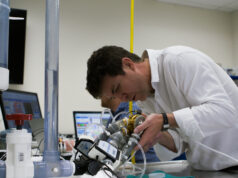
Six-month results from the first 60 patients in the REPRISE II study show that Boston Scientific’s transcatheter aortic valve implantation (TAVI) device (Lotus) is not associated with any new cases of valve-related adverse events between 30 days and six months. The data won Best Abstract 2013 at PCR London Valves (15–17 September, London, UK).
A company press release reports that, on the basis of an independent core lab assessment of paravalvular aortic regurgitation, 76.1% of patients did not have evidence of paravalvular regurgitation at six months and there were no cases of moderate or severe regurgitation. Also, mean aortic valve pressure gradient was 12.1±5.0mmHg, mean aortic valve area was 1.8±0.5cm2, and significant improvements (compared with baseline) in New York Heart Association (NYHA) heart failure symptoms were observed.
“The Lotus Valve System provides the operator with superb control allowing precise positioning and accurate deployment,” said Ian Meredith, director of MonashHeart at Monash Medical Centre in Melbourne, Australia, and principal investigator of the REPRISE II trial. “The results from the first 60 patients of the REPRISE II trial are very impressive, especially with no patients presenting with moderate or severe paravalvular regurgitation at six months.”
According to the press release, the Lotus system is the first TAVI device of its kind with an Adaptive Seal that is designed to minimise aortic regurgitation around the valve that is both fully repositionable and retrievable prior to release.
Boston Scientific expects to release additional REPRISE II data in late October at the TCT (Transcatheter Cardiovascular Therapeutics) conference (27 October-1 November, San Francisco, USA).













